|
|
|
Sort Order |
|
|
|
Items / Page
|
|
|
|
|
|
|
| Srl | Item |
| 1 |
ID:
010294
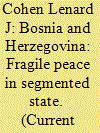

|
|
|
|
|
| Publication |
March 1996.
|
| Description |
103-112
|
|
|
|
|
|
|
|
|
|
|
|
|
|
|
|
| 2 |
ID:
133431


|
|
|
|
|
| Publication |
2014.
|
| Summary/Abstract |
Since the late 1990s international state builders have paid increasing attention to fighting corruption in both Bosnia-Herzegovina and Kosovo. On the surface this effort has brought significant results, since both countries have adopted legal frameworks modelled on the best practices of Western democracies. In practice, however, corruption remains rampant. This disappointing outcome has several explanations: in reviewing the empirical evidence we consider the two countries as cases involving heavily assisted transition from both socialism and war, highlighting how collusive practices between political and criminal interests have played a role in establishing formally liberal but substantively 'hybrid' institutions. We argue that the spread of corruption has been implicitly legitimised by international actors, who have pressured local parties to accept the formal architecture of good governance, including anti-corruption legislation, while turning a blind eye to those extra-legal structures and practices perceived as functional to political stability.
|
|
|
|
|
|
|
|
|
|
|
|
|
|
|
|
| 3 |
ID:
134294
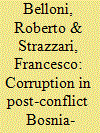

|
|
|
|
|
| Summary/Abstract |
Since the late 1990s international state builders have paid increasing attention to fighting corruption in both Bosnia-Herzegovina and Kosovo. On the surface this effort has brought significant results, since both countries have adopted legal frameworks modelled on the best practices of Western democracies. In practice, however, corruption remains rampant. This disappointing outcome has several explanations: in reviewing the empirical evidence we consider the two countries as cases involving heavily assisted transition from both socialism and war, highlighting how collusive practices between political and criminal interests have played a role in establishing formally liberal but substantively ‘hybrid’ institutions. We argue that the spread of corruption has been implicitly legitimised by international actors, who have pressured local parties to accept the formal architecture of good governance, including anti-corruption legislation, while turning a blind eye to those extra-legal structures and practices perceived as functional to political stability.
|
|
|
|
|
|
|
|
|
|
|
|
|
|
|
|
| 4 |
ID:
052848
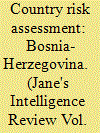

|
|
|
| 5 |
ID:
158276
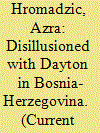

|
|
|
|
|
| Summary/Abstract |
“[T]hrough the complicated, long-term effects of converging postwar and postsocialist forces, the Bosnian state continues to be emptied of its citizens.”
|
|
|
|
|
|
|
|
|
|
|
|
|
|
|
|
| 6 |
ID:
099219
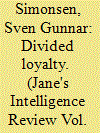

|
|
|
| 7 |
ID:
065203
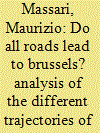

|
|
|
| 8 |
ID:
172317
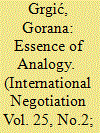

|
|
|
|
|
| Summary/Abstract |
From the perspective of Bosnia-Herzegovina (BiH) today, the legacy of the Dayton Peace Agreement (DPA) remains mixed. The dominant view is that the DPA is the origin of its political impasse, economic stagnation, and failed nation-building. Yet, it is indisputable that DPA has been successful in preventing the recurrence of a major violent ethnic conflict in BiH. More recently, the failures of Syrian peace talks to yield a durable settlement have evoked the lessons from the DPA. However, most analyses have concluded the parallels with the Bosnian war and its resolution are misplaced given the complexity and severity of the war in Syria. This article argues for a more nuanced approach to distilling the Dayton legacy, particularly when it is employed as a historical analogy. It highlights the usefulness of the DPA as an analogy for successful conflict termination, while offering lessons about the pitfalls of externally imposed consociational arrangements.
|
|
|
|
|
|
|
|
|
|
|
|
|
|
|
|
| 9 |
ID:
186386
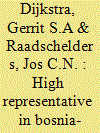

|
|
|
|
|
| Summary/Abstract |
How difficult it is to introduce democratic institutional arrangements in a territory that had mainly experience with authoritarian government is illustrated by the case of Bosnia-Herzegovina (BH). The Dayton Peace Accord of 1995 established the (Office of the) High Representative (OHR) to help the new republic of BH develop into a democracy. After more than 25 years, one cannot but conclude that the creation of democratic institutions has not worked for lack of collaboration between the three most important ethnic groups. At best, BH is a controlled democracy, held together by OHR. The development of this office is analyzed in terms of a neo-institutional framework. We argue that the republic survives so far on the basis of negative legitimacy (accepting the OHR as the binding institutional arrangement). This also suggests that neither developments in a past long gone nor more recent developments (i.e., ‘strong’ path-dependency) prohibit a development toward positive legitimacy (i.e., ‘lean’ path-dependency). The case of BH also illustrates that democracy is hard, if not impossible, to establish when people are internally divided and where (some) domestic and international actors exploit these divisions in the international arena.
|
|
|
|
|
|
|
|
|
|
|
|
|
|
|
|
| 10 |
ID:
065204
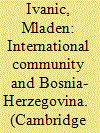

|
|
|
| 11 |
ID:
008679
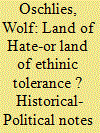

|
|
|
|
|
| Publication |
Summer 1995.
|
| Description |
319-332
|
|
|
|
|
|
|
|
|
|
|
|
|
|
|
|
| 12 |
ID:
073142
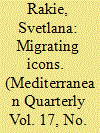

|
|
|
| 13 |
ID:
078048
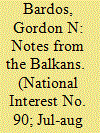

|
|
|
| 14 |
ID:
104282
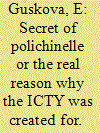

|
|
|
|
|
| Publication |
2011.
|
| Summary/Abstract |
LATE IN THE 20TH CENTURY, the future of the peoples of Yugoslavia no longer belonged to them: it was planned in other countries by top bureaucrats and numerous old and new international structures. The multinational federation was gradually sinking into a crisis punctuated with tragedies, unpredictable and often steep turns and illogical decisions many of them a result of international efforts. Indeed, the Balkan crisis can be described as a glaring example of efficiency and inefficiency of peacekeeping efforts of international organizations which shouldered a misplaced role of arbiters and judges of multisided domestic inter-national conflicts. The lessons to be learned will keep busy many generations of historians and politicians.
|
|
|
|
|
|
|
|
|
|
|
|
|
|
|
|
| 15 |
ID:
086960


|
|
|
|
|
| Publication |
2009.
|
| Summary/Abstract |
This article examines attitudinal differences and similarities among ethnic groups in conflict-affected societies. Conventional wisdom tells us that societies that have experienced violent struggles in which individuals of different ethnic groups have (been) mobilized against each other are likely to become polarized along ethnic lines. Indeed, both policy-makers and scholars often assume that such divisions are some of the main challenges that must be overcome to restore peace after war. We comparatively examine this conventional wisdom by mapping dimensions of social distance among 4,000 survey respondents in Bosnia-Herzegovina and the North Caucasus region of Russia. The surveys were carried out in December 2005. Using multidimensional scaling methods, we do not find patterns of clear attitudinal cleavages among members of different ethnic groups in Bosnia-Herzegovina. Nor do we find patterns of clear ethnic division in the North Caucasus, although our social distance matrices reveal a difference between Russians and ethnic minority groups.
|
|
|
|
|
|
|
|
|
|
|
|
|
|
|
|
| 16 |
ID:
149497
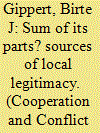

|
|
|
|
|
| Summary/Abstract |
The article analyses the sources of local actors’ legitimacy perceptions towards international peacebuilding operations. Local legitimacy perceptions are increasingly recognised as shaping local behaviour towards international peacebuilding, which influences the effective functioning of the operation. Legitimacy debates in peacebuilding are either absent or imported from the literature on domestic legitimacy, without respect to the specific temporal and spatial situation of international operations. The article first explores which legitimacy sources influence local legitimacy perceptions of international peacebuilding operations. It finds that two sources are relevant: output and procedure. Second, it investigates how exactly legitimacy arises from them. In doing so, it demonstrates that output and procedure are umbrella terms comprising several sub-elements which influence legitimacy in different, sometimes contradictory, ways. Finally, the article empirically explores which of the sources are important to local actors’ legitimacy perceptions using field data from the EU peacebuilding operations EULEX in Kosovo and EUPM Bosnia-Herzegovina.
|
|
|
|
|
|
|
|
|
|
|
|
|
|
|
|
| 17 |
ID:
143580
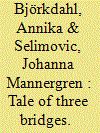

|
|
|
|
|
| Summary/Abstract |
This article explores agonistic processes of peace, which are situated within and constitutive of different spaces and places. Three contested cities, Sarajevo, Mostar and Višegrad in Bosnia-Herzegovina, provide us with local sites where peace and peace building in various forms ‘take place’ as people come together in collective action. Through a close reading of three symbolically and materially important bridges in the towns, we reveal meaning-making processes, as agentive subjects struggle around competing claims in the post-conflict everyday world. The collective, situated and fleeting agency that we explore through the Arendtian notion of ‘space of appearance’ invests space with meaning, belonging and identity. Thus, this article grapples with agonistic peace as it manifests itself in materiality and spatial practices. We use the social and material spaces of the city to locate agency and agonism in peace building as they relate to the conflict legacy in Mostar, Višegrad and Sarajevo in order to advance the critical peace research agenda.
|
|
|
|
|
|
|
|
|
|
|
|
|
|
|
|
| 18 |
ID:
160476
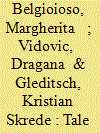

|
|
|
|
|
| Summary/Abstract |
Bosnia and Herzegovina (BiH) experienced an unprecedented wave of nonsectarian antigovernment protests in 2014. Although the key motivating factors generally highlighted, such as economic marginalization and poor governance, were common throughout Bosnia and Herzegovina, the protests did not extend to all parts of the country. Notably, despite very similar initial conditions in the two jurisdictions of the country, the Federation of Bosnia and Herzegovina (FBiH) saw major unrest with a large number of participants in many locations while subsequent protest mobilization was much more limited in the Republic of Srpska (RS). We take advantage of the variation in the responses from the two governments in the same country to evaluate how observed and anticipated government responses can shape the willingness to join dissident activity. We argue that variation in government responses and its impact on perceptions of prospects for successful collective action can help account for the differences in mobilization across the two entities. We test our expectations using a new data set on protest events, participants, and government responses in BiH from January to April 2014. Our findings are consistent with the argument that coherent repressive government policies tend to suppress mobilization, while mixes of repressive responses and concessions from the government can encourage further mobilization. The results for FBiH show clear variation in protest following changes in government behavior and are consistent with the claim that repressive responses likely suppressed mobilization in the RS.
|
|
|
|
|
|
|
|
|
|
|
|
|
|
|
|
| 19 |
ID:
062252
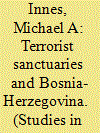

|
|
|
|
|
| Publication |
Jul-Aug 2005.
|
| Summary/Abstract |
This article argues that a model of terrorism and terrorist sanctuaries rooted in post-9/11 strategic thought and the Global War on Terror is inadequate to the study of terrorism in Bosnia and the Balkans. It addresses a series of conventional assumptions regarding Bosnia-Herzegovina's status as a putative terrorist sanctuary, based on a reading of post-war ethnic politics and political architecture. This assessment turns on the basic notion that terrorism in Bosnia is a complex phenomenon linked to multiple domestic and foreign communities, defined along competing national trajectories and intersecting foreign interests, and subject to evolving political circumstances and priorities.
|
|
|
|
|
|
|
|
|
|
|
|
|
|
|
|
| 20 |
ID:
158029
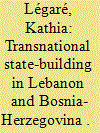

|
|
|
|
|
| Summary/Abstract |
When civil wars end, political institutions are the main topics of conflict. The implementation of peace settlements often stall, and foreign sponsored initiatives might be put in place to build the state as to strengthen peace. This article aims to explain their impact. It proposes that post-conflict reconstruction follows a cycle, which alternates between phases of status quo, debate, and crisis. It argues this process is powered by the struggles between coalitions of political forces, including foreign parties, promoting their own understanding of the peace deal. It compares two cases of deeply divided societies located in a complex geopolitical environment: Lebanon and Bosnia-and-Herzegovina. The analysis focuses on the interrelations between foreign and domestic parties and their evolution by tracing the formation and collapse of transnational coalitions. It shows the major role these coalitions played in breaking the political deadlock and starting constitutional negotiations, but also in triggering a political crisis. The similarities between these otherwise unique cases highlight the limits set on foreign interventions, and explains how actors of the two environments interact. It concludes that if state-building initiatives under external influence can make significant gains, they leave the states highly vulnerable to political instability.
|
|
|
|
|
|
|
|
|
|
|
|
|
|
|
|
|
|
|
|
|